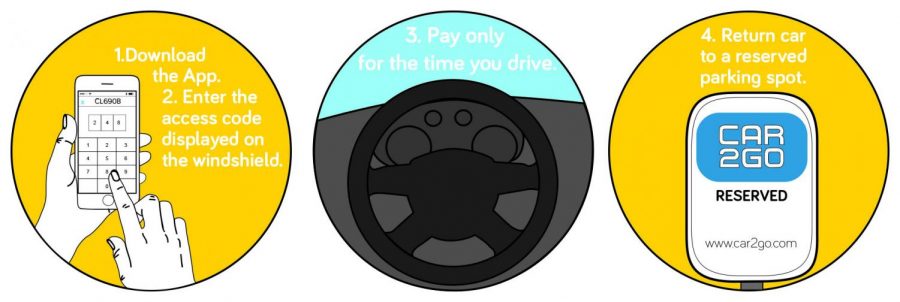Car-sharing pilot program rides into Northwest Side
Car-sharing pilot program rides into Northwest Side
March 3, 2018
Chicagoans will have a new way to travel around the city following City Council’s approval of the free-floating, car-sharing company Car2Go’s pilot program.
Instead of being picked up—which is how Uber, Lyft and the CTA operate—Car2Go operates similarly to Zipcar, a car-sharing service. After ordering a ride, customers locate the car using a live map on the company’s app, unlock the car with an access code and, when their trip is completed, drop it off at an approved Car2Go parking spot, according to the company’s website.
The Car2Go pilot program, which was approved at City Council’s March 28 meeting, will introduce 500 cars to the Near Northwest Side from May 1 until June 2019, but the city can opt out of the pilot as early as December, according to Ald. John Arena (45th Ward), a member of the Economic, Capital and Technology Development Committee.
Even though Arena voted in favor to test the program on Chicago’s streets, he remains uneasy about some of the program’s possible drawbacks.
“[Car2Go is] going to take up room in a traffic lane. It continues to undermine our public transit system, [and] it continues to undermine the taxi cab system, which is already on its knees,” Arena said. “It creates competition to Uber and Lyft, which may be good, but they aren’t the ones hurting in this whole scheme.”
The program may reduce traffic over time, but only if users opt for the car-sharing service in lieu of owning cars, Arena said.
Cars involved in the pilot program can park in virtually any parking spot, according to Arena. A customer will have to pay for parking while renting the car, but if the car is not being used, Car2Go will foot the bill. While meeting with aldermen, Car2Go was “vague” on how it plans to pay the parking meter bill, which concerned Arena; however, he said Car2Go promised to find a solution before the program starts.
Car2Go may not currently have the solution to the problem now, but Chicago will not be the first city in which it operates. Currently the company operates in seven countries and seven U.S. cities including Austin, Texas; Columbus, Ohio; Denver; New York City; Portland, Oregon; Seattle and Washington, D.C., according to its website.
“We’ve seen positive benefits [in Columbus],” said Josh Lapp, chair of Transit Columbus—an Ohio-based group that advocates multimodal and alternative forms of transportation, and has followed the effects of the Car2Go program for two years. “Car2Go is a great opportunity to provide people transportation without having to have an individual car.”
The Car2Go pilot program may also be more desirable for some Chicago commuters, compared to Uber or Lyft because the user does not rely on a driver to provide satisfactory services throughout the ride, said P.S. Sriraj, director of the Urban Transportation Center at the University of Illinois at Chicago.
Although Sriraj welcomes the car-sharing program, he is curious about how it will be received by Chicagoans when they still have Uber and Lyft at their disposal.
Crosby Nelson, a junior interactive arts and media major—who uses public transit, Uber or Lyft about four times a week—said he would more likely use the car-sharing program after graduation when he is no longer eligible for a U-Pass.
While unlikely to use the service now, Nelson said he might use it at the end of the school year when he has to move.
While Arena is still skeptical about the program, he said test runs starting May 1 will provide the city with better data for future votes on the car-sharing service.
“I’m happy to see how [Car2Go] plays out,” Arena said. “[But] if you pull people away from the system, you pull operating dollars out of the system.”








